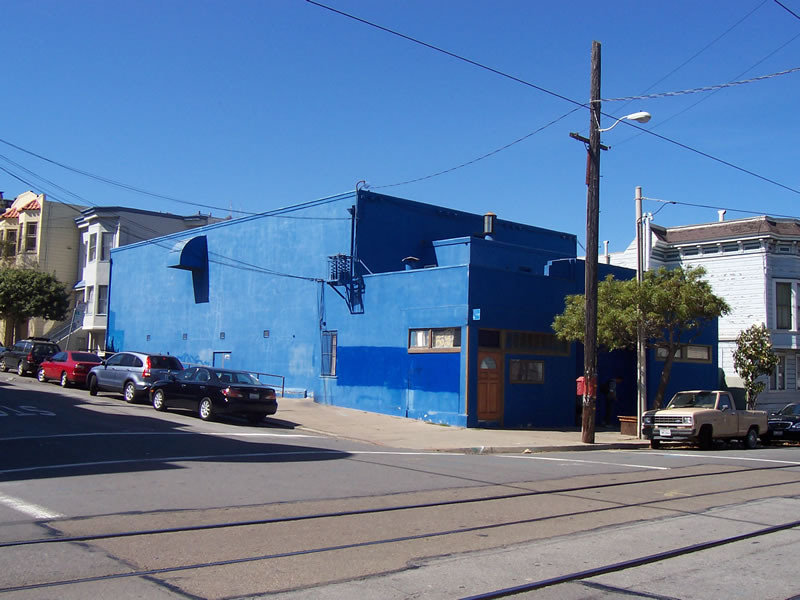
RETURN TO HOME PAGE
FEEDBACK

|
September 2009
RETURN TO HOME PAGE FEEDBACK |

A developer got the green light this summer from San Francisco Superior Court to demolish the blue building at the corner of Church and 28th streets, now occupied by the Church of San Francisco. The firm plans to build a four-story condominium complex that will include retail space on the ground floor.
Photo by Corrie M. Anders.
By Corrie M. Anders
The Church of San Francisco in Noe Valley was supposed to be long-gone by now--knocked down to the studs and born again as a condominium complex.But the "Blue Church," as it's known along outer Church Street, remains the focus of a nasty two-year eviction battle between the Rev. Joesiah Bell and his former development partner.
Last year, the church was in the ascendancy, having won a dismissal of a property title suit (see March 2008 Voice). This summer, however, the legal gods smiled on the developer.
On June 19, an appeals panel of three judges in San Francisco Superior Court tossed out a jury verdict that had favored the church and its homeless tenants. In August, the church lost two more appeals related to its effort to stay in the building, located at 1596 Church Street at the corner of 28th Street.
James Branch, head of Oakland-based J. Branch Developments, Inc., said he expected a Superior Court judge in September to authorize an eviction and that he planned to soon start demolition of the one-time movie theater.
However, church attorney Craig Martin remained resolute. "I don't agree we're out of options," he countered. "We plan to fight whatever they do." (The church also has a separate fraud suit against the development firm that is unconnected to the eviction fight.)
Still, the end appears to be drawing closer for the church, and for a number of poor people who use the facility as a temporary shelter.
"I'm saddened for all the people that got dragged into this...people who have stayed, not having anywhere to go," Branch said. He said 15 to 20 people live at the church with the barest of necessities.
"That's always been a concern for us because the facility was never designed for people to reside there--with no kitchen, no shower, no bedrooms," he said.
Bell, a social activist pastor who in the past has offered a passionate defense of the activities at his non-denominational church, referred all questions to Martin, the attorney.
The church has been surrounded by controversy from the time Bell became its spiritual leader in 1996. He and City Hall tangled over a food giveaway program, and the facility has been a continuous irritant to some nearby residents and store owners, who complain of overcrowded and unkempt conditions.
"Neighbors near the Blue Church have expressed their desire to see something else done with that property," noted Vicki Rosen, president of Upper Noe Neighbors, a residents organization.
Rosen said she personally did not have any issues with the church, outside of concern for the welfare of folks using the building as a shelter.
"I feel bad for some of the people who've been living at the church for a long time, for a number of years," she said. "They're going to be in a difficult situation, I expect. That's the only thing that bothers me."
Branch said his firm would continue with the original construction plan the city approved in September 2006. The $2.3 million project called for three two-bedroom flats, three two-bedroom townhouses, ground-floor retail space, and a nine-space parking garage. Blue would remain the dominant color in the contemporary-style building.
"The entire team has been activated, and everyone is pushing towards a date when we can do the demolition," he said.
Initially, the now dissolved partnership between Branch and Bell seemed like a marriage made in heaven to develop the building, which first opened in 1916 as the Searchlight Theater and converted in 1965 to a church named Holiness Temple in Christ.
The May 2006 deal, which also won plaudits from local residents and Church Street merchants, represented a generous tithing for the church, which was to receive 40 percent of any profits from condo sales.
The developer and the church had agreed to a one-year lease--time enough for the company to wend through the building permit process and for the church to relocate. The lease terminated in October 2007. But the church refused to vacate the premises.
When the developer filed an eviction lawsuit, the church argued in its defense that Branch's firm "acquired title to the property through fraud," and a Superior Court jury agreed in a February 2008 verdict.
However, the judges in the appellate division of the Superior Court ruled that the church failed to show "essential evidence" of fraud. Their June 19 opinion reversed the jury decision.
The appeals panel also refused the church's request to rehear the issue, nor to grant the church permission to file a petition with the state Court of Appeals. The church went to the state appeals court anyway, only to get turned down Aug. 12, setting the stage for the pending eviction order.